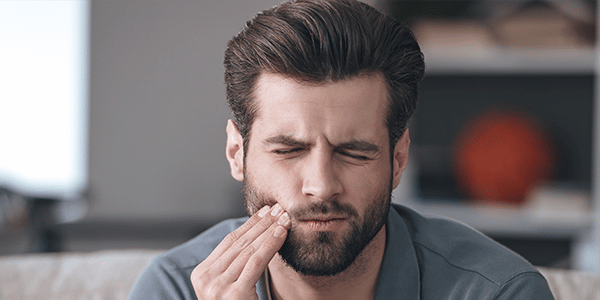TMJ-related pain can often spread to the teeth.
If you are suffering from tooth pain, there are a number of factors that may be causing the issue. In many cases, tooth pain is caused by oral health issues like tooth decay, gum disease and impacted teeth, but it is also possible for TMJ disorders to affect the teeth. Read on to find out how TMJ disorders can lead to tooth pain, and what other issues could be causing you discomfort…
How do TMJ disorders affect the teeth?
TMJ-related problems often cause pain in the jaw, as well as the surrounding facial muscles. In some cases, the jaw muscles can cause referred pain to the teeth. In fact, TMJ disorders are sometimes caused by grinding of the teeth and clenching of the jaw, which in turn, can lead to wear and tear of the teeth, as well as sensitivity. Sometimes excessive clenching can even cause cracked tooth syndrome.Daytime clenching of the jaw is often a symptom of stress, while nighttime grinding of the teeth is related to disturbed sleep and sometimes can be related to sleep apnoea.
What else causes tooth pain?
Although TMJ disorder may be the cause of your tooth pain, it’s important to understand that there are a range of other possible causes. These may include tooth decay, thinning tooth enamel, an impacted tooth, receding gums, and gum disease. If you experience sore teeth, we recommend that you see your dentist for a check-up so that any oral health issues can be identified and resolved. If your dentist does not find any oral health issues that could be causing your pain, we encourage you to come in and see us so that we can help you determine the cause of your discomfort and formulate a tailored treatment plan as soon as possible.
How can TMJ be treated?
If you are suffering from chronic jaw and tooth pain, it may be helpful to have custom neuromuscular orthotics fitted to reduce the impact of teeth grinding. Orthotics are designed to help the muscles relax and maintain ideal joint function, which then helps to eliminate pain and discomfort. Orthotic devices are virtually invisible and are made with CAD/CAM technology, which ensures that they are as thin as possible.
Ideally the treatment for TMJ should involve a holistic approach, as there are often various factors and causes that contribute towards its symptoms. In many cases, a combination of treatments may be recommended. These may include neuromuscular orthotics, low level laser therapy, trigger point therapy, prolotherapy and, if necessary, treatment of breathing dysfunction.
How can we help?
At TMJ Centre Melbourne, we combine the expertise of our dentist and chiropractor to customise treatments for TMJ disorders. A broad range of factors are taken into consideration before a treatment is recommended. Sleep assessments, nutritional support and chiropractic adjustments are just some of the offerings that can complement your treatment.
If you are suffering from tooth pain, or any other symptoms of TMJ, such as headaches or jaw and neck pain, we encourage you to come in and see us. If you would like to make an appointment to see us, please don’t hesitate to get in touch. Discomfort caused by TMJ disorders can be debilitating, and we would love to help to improve your overall quality of life.
